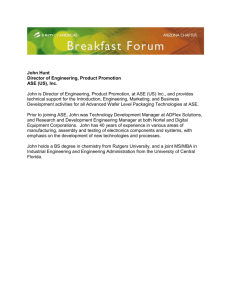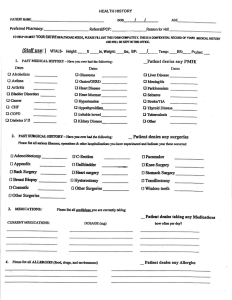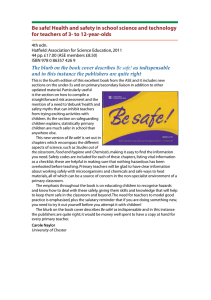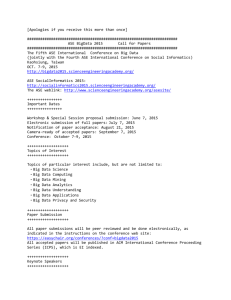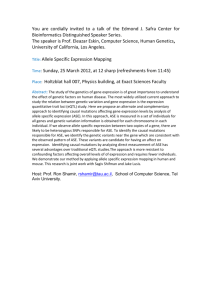LUNAR Council Formation
advertisement
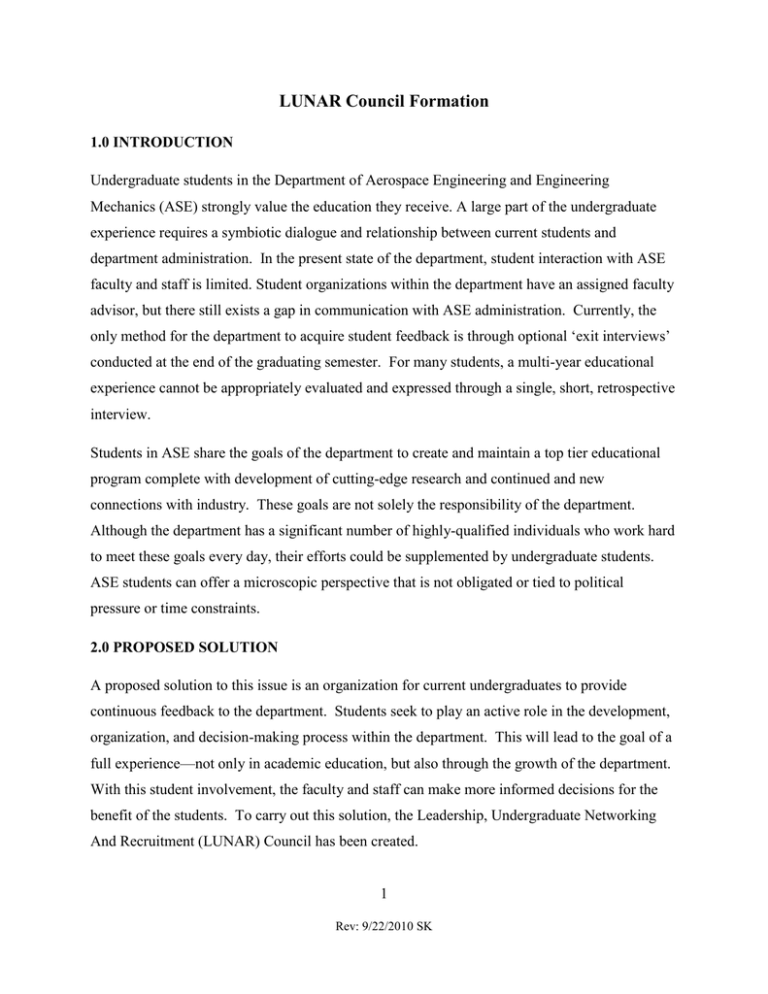
LUNAR Council Formation 1.0 INTRODUCTION Undergraduate students in the Department of Aerospace Engineering and Engineering Mechanics (ASE) strongly value the education they receive. A large part of the undergraduate experience requires a symbiotic dialogue and relationship between current students and department administration. In the present state of the department, student interaction with ASE faculty and staff is limited. Student organizations within the department have an assigned faculty advisor, but there still exists a gap in communication with ASE administration. Currently, the only method for the department to acquire student feedback is through optional ‘exit interviews’ conducted at the end of the graduating semester. For many students, a multi-year educational experience cannot be appropriately evaluated and expressed through a single, short, retrospective interview. Students in ASE share the goals of the department to create and maintain a top tier educational program complete with development of cutting-edge research and continued and new connections with industry. These goals are not solely the responsibility of the department. Although the department has a significant number of highly-qualified individuals who work hard to meet these goals every day, their efforts could be supplemented by undergraduate students. ASE students can offer a microscopic perspective that is not obligated or tied to political pressure or time constraints. 2.0 PROPOSED SOLUTION A proposed solution to this issue is an organization for current undergraduates to provide continuous feedback to the department. Students seek to play an active role in the development, organization, and decision-making process within the department. This will lead to the goal of a full experience—not only in academic education, but also through the growth of the department. With this student involvement, the faculty and staff can make more informed decisions for the benefit of the students. To carry out this solution, the Leadership, Undergraduate Networking And Recruitment (LUNAR) Council has been created. 1 Rev: 9/22/2010 SK 3.0 LUNAR COUNCIL STRUCTURE The LUNAR Council (hereafter referred to as ‘Council’) has a primary purpose to generate student input essential to the growth of the department. They will be an accessible student committee available to provide input on issues affecting ASE undergraduate students. Council members were originally selected by the ASE Undergraduate Coordinator to include leaders from all ASE organizations as well as representatives from each class. Future Council members will be chosen to replace graduating or resigning members in the spring of each year. Nominations for new Council members will be delivered by the current Council and the nominees must each represent a student organization or class which was formerly represented by a graduated or resigned member. Upon nomination, Council candidates will be expected to fill out a short application to express their goals and intentions for the Council which will be used by the current Council in deciding on new members. Newly selected Council members bear a oneyear minimum commitment and are expected to continue participating in their respective student organizations and maintain other qualifications. All members have a minimum overall GPA requirement of 3.0 and total membership in the Council is decided based on diverse representation, but will not exceed 13 members. Factors of diversity include year in school, involvement in student projects, leadership in other student organizations, and connections within the department. Meetings will be held monthly with continued attendance by the ASE Undergraduate Coordinator and occasional visits from the ASE Public Affairs Coordinator. The meetings will be designed as an open forum for discussion of issues and planning of department events. Though regular meetings are scheduled, the Council will be able to convene as needed or required. 4.0 COUNCIL COMMITMENTS The Council will consist of the following duties which follow the acronym of the group title and include leadership, undergraduate networking, and recruitment: 4.1 Leadership The Council will provide three primary leadership purposes: 4.1.1 To act as a primary contact in an ombudsperson role for current ASE students 2 Rev: 9/22/2010 SK Often times, students have criticisms of faculty members that may impact multiple students or the general teaching process for the class; for example, the way homework is presented, the use of the document camera, or the use of the whiteboard. The Council will be able to receive these concerns and work as a committee to determine which issues should be further investigated and ultimately presented to the faculty and/or staff in question. 4.1.2 To help in facilitation of External Advisory Committee (EAC) visits At the biannual EAC meetings, Council members will provide input, either written or via oral presentation, on undergraduate concerns that are compiled throughout the year. In addition, the Council will make recommendations for solutions to the concerns submitted. 4.1.3 To serve as peer advisors during registration advising During the months of April and October, the Council will provide walk-in hours for peer advising to give a student perspective on registration and offer experience to new and continuing students. 4.2 Undergraduate Networking The Council will provide four primary services to improve undergraduate networking: 4.2.1 Advertising for ASE-based clubs and organizations Council members are called on to make flyers for hallway advertising, create slides for display on the plasma screen in the main entry, and give presentations to classes/groups upon request. 4.2.2 Encourage and help plan ASE social events As needed by the Public Affairs Coordinator, Council members will help to plan department-wide social events and recruit volunteers for the events, i.e. Explore UT, Gone to Texas, Family Weekend, and other events to encourage social cooperation. 3 Rev: 9/22/2010 SK 4.2.3 Organize forums on ASE-wide issues If an issue is presented that appears to affect the entire ASE community, the Council will organize and hold a forum to clarify undergraduate concerns and present them to relative faculty and/or administrative staff. 4.2.4 Manage an electronic concerns/suggestion box for ASE student use A survey will be built to allow students the opportunity to submit concerns anonymously. These concerns will be reviewed as a group at the regular meetings, but all members will have access to the submissions as they arrive. 4.3 Recruitment The Council will strive to improve and market the image of the ASE department by reaching out to prospective students: As high school students make decisions for college choice, they often request campus visits, department tours, and meetings with faculty and/or staff. During their visit, they have questions they would like to ask current students in ASE. The Council will manage these activities as ambassadors and also work on initiatives to recruit underrepresented groups as needed. 5.0 EXPECTATIONS OF THE ASE DEPARTMENT The Council will depend on the ASE faculty and staff for guidance and support. In order to establish an understanding across both spectrums, the Council requests to have a representative at any event where department goals and/or constraints are discussed. For the greatest success, the committed interest of key department personnel is necessary. Feedback provided by the students as a function of Sections 4.1.1, 4.2.3, and 4.2.4 must be heard and respected by ASE faculty in order to be effective. The Council expects that invited faculty members appear at either a meeting or a forum as needed. Additionally, it is expected for the faculty member(s) to give a written or verbal response to the affected party and the Council following the forum or meeting once an agreement and/or decision has been made. 4 Rev: 9/22/2010 SK
